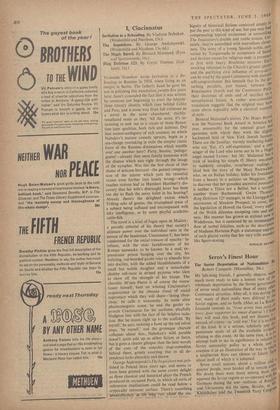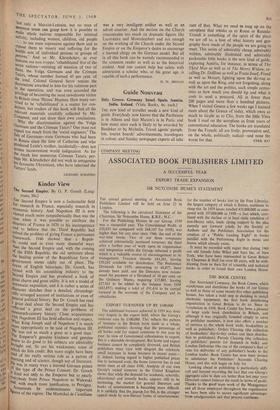Serov's Finest Hour
MY left-wing friends, I generally observe, seen much more ready to take a lenient view of the, wholesale deportation by the Soviet governmen` of seven small nationalities than of many other Communist atrocities. After all, it was during the war, many of them really were disloyal to the Soviet regime, and so forth. (Also, as La Roche' foucauld reminds us, 'Nous avons boas asset fib force pour supporter les maux d'autriti.11h4°_, they will read this book, and not dismiss it-- Unread, of course—as 'cold war.' For it is nothing of the kind. It is a serious, scholarly and r.s. passionate study of all the available evident; relating to this event. At the same time, it is attempt both to see its significance in relation r Soviet nationality policy as a whole and examine it as an illustration of the way in whlet, a totalitarian State can silence or falsify Pe - about itself of which it is ashamed. Seven small nations, about a million and a quarter people, were herded off to remote areito No doubt there were many among them wile opposed the Soviet regime or co-operated Vvith!tis Germans during the war—millions of RusSir:'1.4r, and Ukrainians did the same. Besides. as ss, Khrushchev told the. Twentieth Party Cong'
'cot only a Marxist-Leninist, but no man of common sense can grasp how it is possible to make whole nations responsible for inimical activity, including women, children, old people
• • • to use mass repression against them and to expose them to misery and suffering for the hostile acts of individual persons or groups of Persons.' And so Mr. Khrushchev, as ever humane ma non troppo, 'rehabilitated' five of the seven nations—omitting all mention of two of _them, the Volga Germans and the Crimean Tatars. whose number formed 43 per cent. of the total. Colonel General Serov retains the decorations awarded to him for his valorous part
the operation, and was even accorded the Privilege of becoming the most unwelcome visitor to Britain since 'Hyena' Haynau. How many sur- vived to be 'rehabilitated' is a matter for con- jecture, but readers of this book will find all the relevant materials carefully collected by Mr. Conquest, and can draw their own conclusions.
Why the discrimination against the Volga Germans and the Crimean Tatars? One must not expect too much from the 'social engineers.' The fate of Germans—even Germans who had been In Russia since the time of Catherine and who Produced Lenin's mother, incidentally—does not arouse inconvenient world indignation. As for the much less numerous Crimean Tatars, per- ni_aPs Mr. Khrushchev did not wish to antagonise his favourite Ukrainians, who have inherited the Tartars' lands.
LEONARD SCHAPIRO



































 Previous page
Previous page